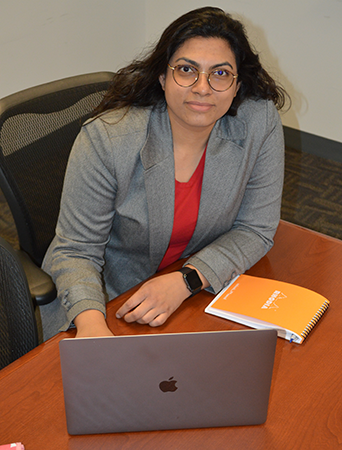As computer scientists, our responsibility is to use our skills to promote societal change in a positive way.
Sneha Nagpaul

Sneha Nagpaul, who is earning her master's degree in computer science, is using her skills to identify crime scene locations.
Computer science courses aren’t just for tech-savvy students.
More Mason undergraduates should consider taking at least one class in computer science, says Sneha Nagpaul, who is earning her master's degree in computer science.
“When I meet a freshman or sophomore Mason student who has some flexibility in what they are taking, I advise them to take a programming class,” Nagpaul says. “I encourage them to explore science and technology.”
Once they’ve tried it, she’s convinced they’ll like it.
They’ll discover that computer science is being used everywhere, and that it is essential to many fields, says Nagpaul, who is using her advanced computer science skills to identify crime scene locations.
Her work is part of the crime prediction and prevention research directed by her advisor Huzefa Rangwala, an associate professor in computer science at Mason Engineering. "As a master’s student, Sneha has had the opportunity to do cutting-edge research that lays the groundwork for a new Department of Homeland Security project," Rangwala says.
Nagpaul grew up in New Delhi, India, where she earned a bachelor’s degree in computer science. In 2015, she joined the INTO Mason program, a pre-master's program that provides international students a path to various graduate degrees.
She chose Mason Engineering for several reasons. “Mason was one of the best schools on my list,” she says. “It was near D.C. I came from a capital, and I wanted to be near a capital. Mason is perfect because it is not in the city so I’m not distracted all the time, but it’s not too far away either.”
After finishing her master’s degree this semester, she’s considering her next step, including the possibility of getting a PhD. One day, she’d like to start her own technology company. “I’m inspired by what I’ve been exposed to while I have been here.”
“As computer scientists, our responsibility is to use our skills to promote societal change in a positive way,” Nagpaul says. “My idea is to add value wherever I am, and I have found technology to be the best tool.”
As a master’s student, Sneha has had the opportunity to do cutting-edge research that lays the groundwork for a new Department of Homeland Security project.
Huzefa Rangwala
